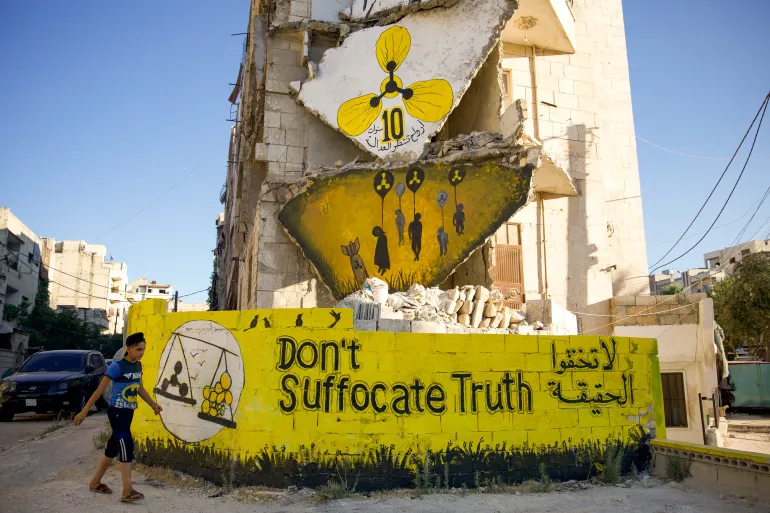Twelve Years of Grief, Silence, and Betrayal
Mural art installation in Idlib, August 2023, depicting bodies hung by chemical balloons as part of the “Don’t Suffocate the Truth” campaign commemorating the 10th anniversary of the attacks on eastern Ghouta, photographed by Ali Haj Suleiman/Al Jazeera.
Twelve years have passed since the horrifying attack on the people of Damascus’ Ghouta district, but the nightmares of that day are just as vivid today as they were over a decade ago to the survivors. Shortly after midnight on August 21, 2013, Bashar al-Assad’s regime launched a sarin gas attack on the towns of Zamalka, Ein Tarma, and Irbin. Entire families were gassed in their sleep in the premeditated attack, which left over 1,400 people dead, including children, and nearly 6,000 others with lasting effects from suffocation and respiratory problems, according to the Syrian Network for Human Rights (SNHR).
Syrians remember, as they have year after year, the devastation wrought by the regime against its people. Commemorating the 12th anniversary of the chemical attacks, Nour El Sayed’s anecdotal essay, “A Late Mourning for Ghouta’s Swallows,” published in Al Modon, reflects on the victims of the attack and the fear that swallowed her life ever since the event.* “That night, just as tonight, I didn’t sleep,” she writes. “The tears for the children of Ghouta have their own unique grief, a burning taste we only hear about in Hiroshima, in our school chemistry books, and in history and its myths. A death that crossed the threshold of annihilation and loss into an isthmus unique to it, tailored to its own size and accommodating all pain.”
Sayed’s recollection of the events is layered not only with grief but also with an overwhelming anxiety. She recounts, “I no longer remember how I received the news, but fear filled my heart at the thought of an end I knew nothing about. How did they die? Did they suffer? Where would they be buried? Will gases seep into our neighborhood? How can we feel safe and sleep when there are muffled screams a few kilometers away?” Witnessing the lifeless bodies of children on the news, positioned as if they were merely sleeping, Sayed had looked at her slumbering two-year-old son to make sure he was still breathing, finding relief in the sounds of his breaths yet overcome by the terror unfolding around them. She recalls her shaken state: “I wake up with a small gasp, a gasp these children were deprived of, so their death was silent and terrifying.”
The attack was relentless, for not long after the chemical massacres, Assad’s bombardment of Qalamoun began, where Sayed’s parents lived. She waited with bated breath for the moment the attacks would shift towards her direction. She writes, “The terrifying specter of death haunts us in the queue, a death we had never experienced before!...the Syrians have experienced all forms of death, let down by the combined forces of Empedocles in their burial — water, fire, and air!”
Despite 12 years passing, the wounds of the Ghouta attack have never had the chance to heal. “We were deprived of mourning. This mourning has been repeated surreptitiously for 12 years,” explains Sayed, referring to the constant state of danger with no reprieve under the Assad regime. She finds herself envious of friends living abroad, who could mourn from relative safety: “Every August, I envied those friends abroad who found a way to mourn, those who wrote about that night, those who changed their Facebook profile picture to that icon that looked like a yellow rose, but carried such danger that it made my eyes squint.”
Now, with the fall of the regime, Nour El Sayed allows the tears she had been holding back for 12 years to finally fall. “It’s midnight, and I’m replaying video clips of that night, crying aloud this time,” she writes. “I wail over the names, unafraid that someone might hear and report me. I changed my profile picture to black, a generation late — my grief, which has long deserved to be made public, even in the virtual world.”
In remembrance of the victims, Sayed bids that Syrians do not avert their eyes from what still needs to be done now that the regime has fallen: holding accountability. She asks, “But does the right to grieve keep sorrow young and raw? Or does the absence of justice — lost somewhere in the corridors of law — keep the wound fresh?” She will continue to remember those who denied and mocked the crime, those who justified and worked to falsify it, and “those who turned their backs on those children as if they were nothing to them.” Today, just as in the past, accountability must be held for those responsible for senseless violence and terror. In Sayed’s words: “I am still where I am, I have not moved, and here is history repeating itself... as if Syrian relations are threatened with collapse after every massacre!”
*Nour El Sayed’s essay, “A Late Mourning for Ghouta’s Swallows,” was published in Arabic in Al Modon.
This article appeared in Inside Al Jadid Reports, No. 136, 2025.
Copyright © 2025 AL JADID MAGAZINE

